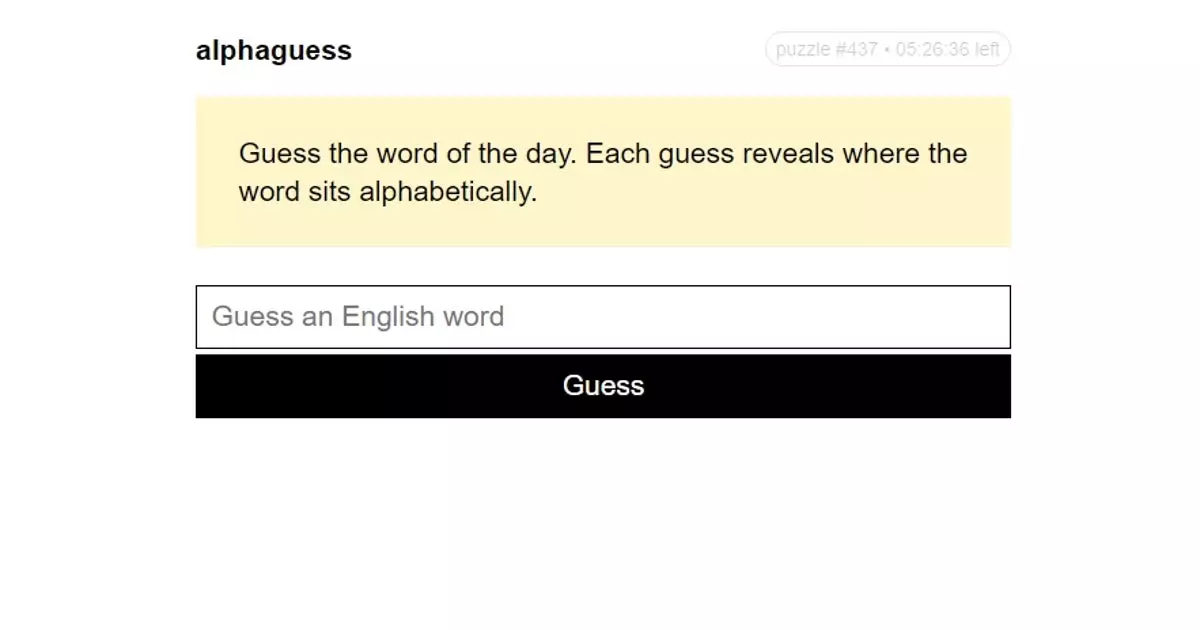In a world brimming with complex challenges and multifaceted tasks, the enticement of simple puzzle games like Alphaguess stands out as an intriguing paradox. These games, while ostensibly frivolous, possess an undeniable charm that can subtly siphon away our attentiveness. Alphaguess, for instance, presents players with a daily conundrum: guess a hidden word through a series of alphabetical hints derived from their guesses. This setup reduced to its essence seems trivial. Yet, therein lies its magnetism, drawing users into a vortex of distractions that, ironically, may curtail actual productivity.
The Relationship Between Complexity and Engagement
Despite their uncomplicated nature, games such as Alphaguess and Wordle cultivate an engaging experience that often goes unrecognized. Upon first glance, the mechanics appear to lack the depth typically associated with so-called ‘puzzle’ genres. One might argue against labeling them as puzzles at all; unlike traditional puzzles, they don’t require a nuanced thought process or strategic planning. They are more akin to guessing games—a fleeting diversion rather than a sustained intellectual challenge. Yet users worldwide immerse themselves in these pastimes, demonstrating that simplicity can be a potent vessel for engagement rather than a barrier to it.
Reflecting on my own journey with Alphaguess, I found myself trapped in a cycle of indecision despite the game’s straightforward rules. My initial guess—“muddle”—was born of a desire to dissect the alphabetical framework effectively. Yet, faced with ambiguity after numerous guesses, the enthusiasm of discovery turned into a laborious grind. This internal conflict exposes an interesting dynamic: as players grapple with fading clarity among potential solutions, the game’s appeal starts to wane. It points to a significant flaw in my approach—or perhaps in the design itself. While the goal is simplicity, achieving it can be more challenging than anticipated when fixation on a singular outcome persists.
Interestingly, the enjoyment derived from these games can often hinge on nostalgia rather than novelty. Much like the age-old pastime of guessing numbers during road trips, games such as Alphaguess reawaken forgotten pleasures from our youth. They evoke a sense of camaraderie and friendly competition, despite being solitary pursuits enjoyed in a digital realm. However, the subconscious realization that what I’m engaging with is little more than a clever distraction undermines the satisfaction gained from my victory or defeat.
This brings us to a crucial examination of what puzzles like Alphaguess represent in the broader context of our daily activities. They serve as microcosms of distraction in a time where productivity is idolized. Rather than inciting personal growth or learning, they often function merely as self-imposed barriers to real achievement. Through the lens of self-reflection, it becomes apparent that while engaging with such games can provide a momentary escape, we must remain vigilant against their potential to derail our focus altogether. The question we are left with is whether these innocuous distractions serve a purpose or merely contribute to our growing list of unformed ambitions and unrealized potential.

